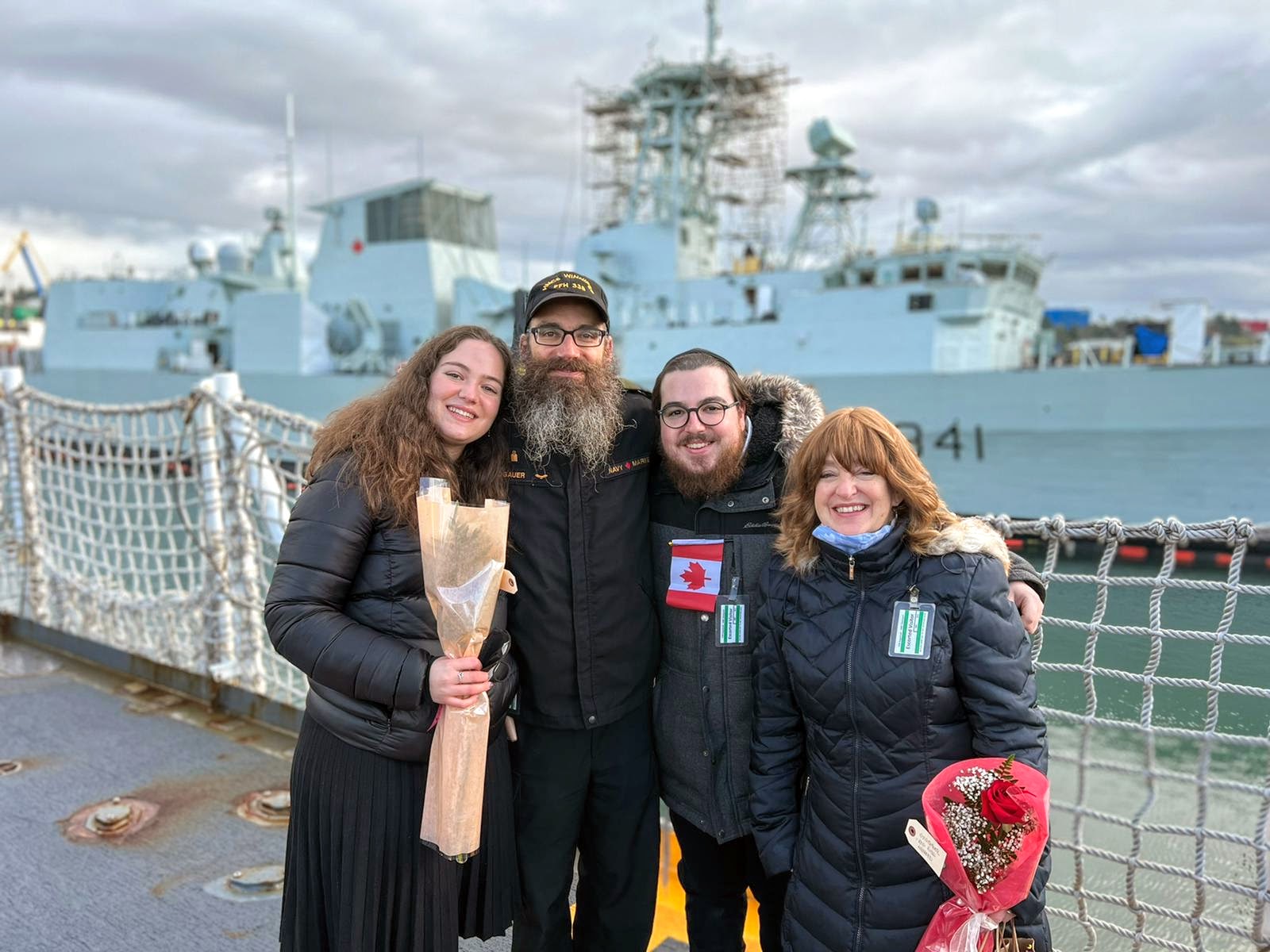First Rabbi deploys in RCN ship to better understand challenges sailors face
Navy News / January 24, 2022
Her Majesty’s Canadian Ship (HMCS) Winnipeg’s Chaplain made a bit of history during the ship’s recent deployment on Operations Neon and Projection in the Indo-Pacific. Captain (Capt) Rabbi Dr. Noteh Glogauer was the first Jewish Rabbi to deploy in a Royal Canadian Navy (RCN) warship.
While Capt Glogauer got to participate in the excitement of Ops Neon and Projection, including the occasional helicopter flight, the main reason the husband, father and grandfather requested to deploy was to better understand the challenges sailors face first hand.
As the ship Chaplain, Capt Glogauer was the one many on board turned to for support with their most personal issues.
“The role of the Chaplain is to loiter with intent, drink lots of coffee and tell bad jokes,” he said quoting one of his mentors, noting that it was his goal to be as visible as possible on the ship so that sailors would know he was available 24/7.
“I was the only Chaplain on ship. It was 259 other people, it was a privilege, and it was on me to develop the relationships and create the openness for people to see that they actually can come and seek support.”
He served the sailors breakfast, lunch and supper daily to keep a pulse on the crew, and checked in with those he noticed might be feeling down.
“It’s not about me and where I am coming from,” he says of his approach to counseling sailors. “It’s about having empathy.”
Empathy is about making a real emotional connection, says the Rabbi. It is the ability to understand the challenge that the person is experiencing, validate their feelings, and to walk with them so they know that there's genuine support to help them work through the issue.
“There is nothing more important than providing a safe environment where someone feels supported and not judged.”
The Rabbi admits that he’s not what most people typically expect from a Canadian Armed Forces member on board an RCN ship.
“I definitely don't look like the old military, because of who I am,” says the Rabbi. “I'm a Hasidic Orthodox Jew. I wear a camo yarmulke (Jewish head cover) and have an untrimmed beard because that is a tenet of our faith.” But looking like someone who doesn’t fit the mold makes him more relatable to someone who might feel like an outsider, he believes.
“The military sees value in me being here, because of who I am, inside and out.”
Rabbi Glogauer said the entire experience has been a real eye-opener, helping him better comprehend what deploying means for the RCN’s sailors and their families and loved ones back home.
The Rabbi said that leading up to deployment he gained an understanding for that feeling where family members start to distance themselves a little bit, almost like a protective instinct, before the deployment. “I did notice I was distancing myself a little bit beforehand, too,” he said.
He also realized that during the deployment a lot of the physical, mental and financial burdens were placed on his wife in taking care of their family.
Then there's the challenge of communication.
“Being cut off from family is really hard,” said the Chaplain.
Rabbi Glogauer spoke about the longest leg of Winnipeg’s deployment -- 24 days without ports and mail, and challenging communications with Wi-Fi.
“You begin to understand the stress that people start to have. That's a huge strain.”
Maintaining his own relationships from afar helped the Rabbi learn more about what others on board were experiencing.
“My first grandchild turned one in November during the deployment. And for most of his milestones, my family could go and visit, but I couldn't … so that feeling gave me a much better understanding of what our members are feeling while separated from their loved ones.”
And while time alone on ship can be a stressor for some, for others it represents an opportunity for personal growth, to work on their relationship skills and to do things for their friends or loved ones.
One evening in the wardroom, the Rabbi and a few others noticed another sailor was crocheting. About three or four sailors joined in and started crocheting together once a week.
“I started to crochet something for my grandson. I learned a new skill here because of the amazing variety of people and the desire for personal connections.”
As one of the other members spoke Spanish, some sailors started to speak Spanish, too, to improve their language skills. Another sailor was an experienced guitar player. There were a couple of extra guitars on board, so people started jamming together to improve their playing.
One modification he had to make was to the name and format of the regular Sunday meetings, traditionally led by a priest or pastor and called “Church Services”. The Rabbi changed the name to Sunday Services. The format became an open discussion group focused on topics relevant to the members aboard, such as leadership in confrontational situations, building resiliency, and developing purpose in life, to name a few.
It's more about the feeling of connectedness to others rather than preaching said the Rabbi. “The bond of collegiality where the value is in teamwork, strength in unity and relationships, that’s what fosters purpose in life.”
“I asked members for what do they want to be remembered? And have they made a mark in their day-to-day contribution to the good of their team, the ship, the Canadian Armed Forces and their family? That’s my role – to help them frame their life’s journey in as personal and meaningful way as possible.”
HMCS Winnipeg returned to its homeport of Esquimalt, B.C., on December 16, 2021, after transiting over 30,000 nautical miles on Operations Neon and Projection in the Indo-Pacific region.


